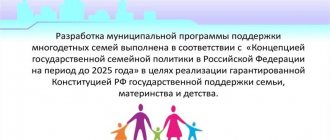It is generally accepted that large families are more traditional: marriages here are made in heaven and partners stick to each other until the end of their days. In fact, divorce in a large family today is also a common phenomenon and the reasons for separation are similar to the reasons that provoked divorce in an ordinary family. So, let's talk about the legal and some psychological aspects of such divorces.
Benefits for low-income families in 2021
Along with durable goods, needy Muscovites can receive food. The scheme is the same: if you have a social card, you will receive points on it, which partner stores will accept for payment. The top-up amount is 2,000 points (or 2,000 rubles). If there is no card, a family with children will be given a food package at the social service center or social assistance center.
In almost all regions of the Russian Federation, federal maternity capital is provided - a payment due to parents at the birth of a third or fourth child. The specific number of children to receive money is set by local authorities.
The size of payments also depends on the regions: if in one region parents can receive 50,000 rubles with a certificate, then in another - all 150,000 rubles. The average value for all regions is approximately 100,000 rubles.
Money is allocated from local budgets and can be spent on the following needs:
- Purchase of real estate, renovation of existing housing;
- Repayment of mortgage debt;
- Education, treatment of the child;
- Buying a car.
Details must be obtained from Social Security.
Collecting child support is the most common issue among parents with children after a divorce. To receive payments from your ex-spouse through the court, you just need to take a few steps:
- Submit a statement of claim and the necessary documents to the court.
- Wait for the claim to be accepted for consideration.
- Participate in court hearings.
- Receive a court decision and writ of execution.
Finally, you can present a writ of execution for forced deduction of payments from the salary to the employer of the alimony obligee, or to the bailiff service.
Example No. 1: collecting alimony from the father
The Mironovs divorced in 2021. The son stayed with his mother. The father promised to pay child support, but no payments were received from him for several months. Then the woman decided to claim them through the court in the amount of 25% of the payer’s earnings - 30,000 rubles.
The court granted the claim. According to the writ of execution, the man was ordered to pay 7,500 rubles monthly. per child.
Question No. 1. What is needed for an employer to provide an additional day off to an employee raising a 4-year-old child on his own?
To do this, just contact the director with an application and the child’s birth certificate.
Question No. 2. Is it possible to collect alimony at the same time as divorce through the court?
Yes, such an opportunity is provided. The cases will be considered in one proceeding.
Benefits for large families and mothers
At the birth of her third child, a mother with many children (benefits in 2014) receives a payment of 5,133 rubles every month. In addition, benefits and benefits for large families provide money to compensate for the rising cost of living. If a third or fourth child appears in the family, and the eldest is not yet 18 years old or they are full-time students, the amount of benefits is 600 rubles. When the fifth child is born, benefits for large families increase and they receive an allowance of 750 rubles.
First of all, it is worth noting the benefits for large families, which include a discount on various utilities. It should be no less than 30% of the total cost of payment for the apartment, heating, light, water, etc. If a family lives in a rural area and does not have central heating, then heat benefits for families with many children will depend on the average cost of the fuel used (wood, coal, peat).
Benefits for divorced women with children under 14 years of age in 2021
Every low-income family that has received this status can count on support. Payments are made from the local budget; most often such assistance is provided for families with children.
The state has provided the following social benefits and benefits for low-income families in 2021:
- Child benefits;
- Providing social mortgages on preferential terms;
- Subsidies for payment of utility bills;
- Tax deductions at the place of work;
- Free travel on public transport;
- Free meals in school canteens;
- Receiving a basket of products for a newborn in the children's kitchen.
The amount of the benefit depends on the situation and region of residence. Thus, it is possible to receive targeted assistance, for example, by September 1 to purchase goods for a schoolchild. In educational institutions, the amount of benefits for students from low-income families is determined independently.
Which family is low-income?
Only low-income families can count on payments. This status is determined based on average income over the last three months. If it turns out to be less than the subsistence minimum, a benefit will be assigned.
Thus, the following families can count on help:
- Incomplete, where there is only one parent;
- Large families;
- Those receiving a minimum income;
- Military families;
- Families that include pensioners and disabled people.
A family where its members deliberately do not work or engage in bad habits will not be able to apply for benefits. To keep your income to a minimum, you need to register with the Employment Center and actively look for work.
Low-income people are entitled to two types of benefits:
- One-time assistance (EDA). Usually it is timed to specific life situations of a person: the birth of a child, loss of housing, etc. It is issued once.
- Regular payments. They are credited once a month. They need to be renewed every year, provided that the family’s income and situation corresponds to the “poor” status.
The size and procedure of payments depends on the specific case.
Currently, such families can receive the following one-time assistance benefits:
- Benefit for pregnant low-income people. To receive it, the mother needs to register for up to 12 weeks. The payment amount from 02/01/2021 will be 708.23 rubles.
- When a child is born, the state pays 18,886.32 rubles.
- Benefit for the poor for a child adopted from an orphanage. The amount is 18,886.32 rubles, but it can only be received six months after the court makes a verdict on adoption.
- Social benefits for low-income families on September 1. It is paid to help parents get their child ready for school. The amount of assistance depends on the region. Muscovites receive the most - 5 thousand rubles per child.
- Pregnant women, if their husbands serve in the RF Armed Forces during this period. They are entitled to 29,908.46 rubles.
- Financial support. The conditions for obtaining it vary depending on the subject of the Russian Federation. The amount also depends on the specific region.
In addition to these payments, other types of assistance may be established in each region.
You must apply for benefits annually – before the end of September.
You will need to collect a complete set of documents:
- Application requesting monthly payments;
- Personal document of parents;
- Birth certificate of babies;
- Certificate of family composition;
- A paper confirming income for each member - issued by the employer or the Pension Fund;
- Bank account statement – details for transferring benefits;
- Other papers, for example, a document from the Employment Center, a certificate of adoption.
Difficulties in assigning benefits may arise if one of the family members has disappeared, and it is not possible to establish his whereabouts and obtain certificates of income. In order for the payment to be assigned, it is necessary to obtain a certificate from the police about the initiation of a criminal case based on the search. Accordingly, you need to apply there.
The procedure for establishing large families
Large families are established in the social protection bodies of the Russian Federation. A special certificate is issued.
The following documents must be provided:
- parents' passports, marriage certificate;
- children's birth certificates, passports;
- certificate of composition of the applicant’s family;
- a certificate from an educational institution or military registration and enlistment office (if children are over 18 years old);
- court decision on adoption, agreement on guardianship or placement in a foster family;
- statement.
The application is submitted by the mother or father. Organs “establish” having many children for a year.
Every year, the same package of documents is provided to confirm, “extend” status or supplement data: information on a newborn child is submitted, and other certificates are provided.
The status of having many children is terminated if:
- the ward turns 18 years old;
- children are transferred to a boarding school or orphanage for care;
- parents are limited in their rights or deprived of their rights;
- adoption is cancelled;
- children are sent to an educational colony based on a court verdict;
- children acquire full legal capacity as a result of emancipation or marriage;
- a student or conscript soldier gets married;
- The registration period for having many children expires (one year).
The authorities issue a certificate for a year. Employees explain the meaning of the certificate for the family and its validity period.
Typically, such a certificate is enough to receive and use a number of benefits for a large family: to pay for utilities, receive free meals at school, get service at a clinic without waiting in line, and so on.
Are there benefits, allowances and payments for a divorced woman with a child?
You can contact:
- To the social protection authorities.
- At the MFC.
Registration can also be completed on the State Services website. Social security approves benefits for the poor within 10 working days from the date of application.
What date do benefits arrive?
Money begins to be transferred no later than the 26th day of the month following the month in which the application for financial assistance was accepted. If a family receives regional payments, the accrual period is set by local authorities.
Registration of all types of benefits for a divorced woman with a child is carried out approximately according to the same scheme:
- The woman finds out which authority she needs to contact, and also finds out the list of required papers.
- Collects documents and submits them to the authorized body.
- Waits to review the documentation and find out the answer.
- If the verdict is positive, the applicant is granted a benefit. When a claim for benefits is unreasonably denied, you can challenge the decision by filing a complaint or going to court.
A low-income family is a family whose average per capita income is less than one subsistence minimum per person . Depending on the type of benefit or benefit, the amount of average per capita income can be calculated over a period of 3 months or a year. In addition, different time periods are considered for each type of benefit.
Recognition of a low-income family is made on the basis of an application, certificates of family composition and income.
The terms low-income and low-income should not be confused. A low-income family is one that does not have enough total income to live on. A family is considered low-income if its living space does not allow them to live comfortably in the same area.
To recognize a family as low-income and receive benefits, one of the family members must contact the social protection department or the MFC with the relevant documents. After confirming the relevance of all documents, social security assigns the family low-income status, for which a certificate is issued upon request, for example, for a school or kindergarten.
The status of a low-income family must be confirmed once a year , but some organizations require a certificate to be provided once every 3 months.
If social security finds out that a family intentionally hid their income to receive benefits or benefits, they will be required to return all excess money received. Therefore, as soon as the family’s average per capita income increases to the subsistence level, the applicant must contact social security to terminate the assignment and payment of benefits.
Standard child benefits
These are the types of material support that every family receives, regardless of its status:
- Benefit during pregnancy and childbirth.
- One-time assistance at the birth of a child.
- Regular monthly allowance until the child is one and a half years old.
- Monthly compensation payment until the child reaches three years of age.
- A cash benefit that is paid to children under 16 (18) years of age in certain regions and subject to certain conditions.
Note!
To clarify information on a specific type of benefit and the conditions for its registration, the applicant must contact the social protection authorities or the place of work (maternity benefits).
Help for low-income families in Russia in 2021: who can count on what?
Subsidizing utility bills, targeted support and compensation for tuition in preschool institutions is not an exhaustive list of what payments are due to low-income families in 2021 with one or more children. Over the past two years, the state has significantly increased the list of subsidies and various types of benefits provided to these citizens.
Low-income residents of the capital, where the cost of services and goods is traditionally higher than the national average, can count on receiving more impressive financial assistance. Here are the payments that low-income families are entitled to in 2021 in Moscow: in addition to the benefits and cash subsidies provided for by law, there is regional assistance for children under 18 years of age. Its size is determined taking into account property security and the subsistence level.
General conditions for registration and payment of benefits:
- available only to the poor (with average per capita income below the regional subsistence minimum);
- is due to each child - natural, adopted or adopted - under the age of 16 years (or up to 18 years if he is a full-time student);
- funds are allocated from the regional budget;
- Typically, the amount of the benefit is subject to annual indexation, in accordance with the laws in force in the region.
When considering the question of what payments are due to low-income families in 2021 with 3 or 4 children, it is worth emphasizing that in regions with insufficient fertility (less than 13.3 newborns per 1,000 people over the last three years), low-income large families can count on a special payment, which is determined according to a presidential decree. It was introduced not only to improve the well-being of families, but also to improve the demography in the country:
- The benefit is paid for each child in a large family, starting with the third child under the age of 3 years.
- Provided if the applicant and his child have Russian citizenship.
- The benefit amount corresponds to the local subsistence minimum.
Features of the “large family” status in some regions of the Russian Federation
Many regions of the Russian Federation adhere to the rule: large families - at least three children per family.
If a subject that adheres to a traditional way of life has a dense population, families with more than three children are considered large. For example, in Ingushetia, a family receives the status of a large family if there are more than five children.
The demographic crisis plays a big role. In some regions, the “child threshold” has decreased: in Mordovia, Tyva, and Mari El, until 2012, families had large families with four or more children. But since 2021, the number has dropped to at least three.
Until what time a family is considered to have many children, the law does not explain. From the perspective of society, a family will have many children, even if there are adult children in it. But assistance from the budget will go to families with minor children.
Many people wonder whether a family with many children is considered if the eldest child is 18 years old. If the family has full-time students of secondary or higher educational level, parents have the opportunity to apply for the establishment of large families until the children turn 23 years old.
In other regions (Jewish Autonomous Okrug, Oryol Region), a family can have many children, where the child has reached 18 years of age, but is called up for military service in the army.
Each region independently prescribes the requirements for determining large families. Sample list of requirements:
- each family member must have Russian citizenship;
- the family lives in the region where it plans to receive benefits;
- the number of children provided for by law;
- children always live with their parents (or with their father or mother if their parents are divorced);
- children do not temporarily live in the family, as they study at a secondary vocational or higher educational institution, and also serve in the army.
If temporarily residing children are married (students or soldiers), they are not counted towards recognition as a large family.
Let's find out whether a family with many children is considered if the children are from different fathers.
Stepchildren
When obtaining a large family, all children and teenagers from previous marriages are taken into account, who are raised together with the others (if the children remained after a divorce with their mother or stepfather and half-brothers and sisters).
Children counted:
- wards;
- adopted;
- reception rooms;
- if children are from different marriages: stepdaughters, stepsons (if a man marries a woman with two children, he becomes a father not only to his own child, but also to his wife’s children).
The last two categories need to be considered separately in each region.
For a number of benefits, the status of a stepdaughter is sufficient (if you need to receive free meals at school), but, for example, in order to receive a plot of land, large families must have officially adopted children.
In 2021, in order to recognize the status of having many children, the following children cannot be counted:
- in respect of which the parents were deprived of parental rights or limited in them;
- guardianship of whom was granted by persons who are not parents;
- who are brought up in closed boarding schools and orphanages;
- emancipated persons who entered into marriage before reaching the age of majority (who acquired full legal capacity “early”);
- who were divided between parents due to divorce (fewer children live with the father or mother after the divorce process than what is necessary for recognition of a large family);
- whose adoption decision has been cancelled;
- dead.
What payments are due to low-income families in 2021?
So, we figured out what payments are due to low-income families in 2021 with two or more children. But the state has not only developed measures of material assistance to low-income citizens of the Russian Federation. It offers comprehensive social assistance, including:
- providing free medicines to children under 3 years of age;
- the right to free legal advice, written or oral;
- preferential mortgage rate;
- a special place on the list of those waiting for an apartment from the state;
- provision of benefits for utility bills;
- issuance of a land plot free of charge;
- earlier retirement than colleagues;
- free transport for individual family members;
- tax benefits (various types of deductions);
- benefits at work (additional days off, the ability to choose a convenient time for rest, etc.);
- the possibility of a free trip to summer camp;
- free parking;
- provision of free fuel for heating homes and clothing.
- Microloan
- Consumer loan
- Credit cards
- Business loan
- Mortgage
- Deposits
- Car loan
- Trade loans
- Webmoney loan
Therefore, the only way out for such mothers is to seek the recovery of alimony from fathers through the court.
An incomplete family is a unit of society where, if there are both parents, the child remains in the care of one of them, most often this is the mother. Applicants acquire the corresponding status in various life situations. Legal signs of an incomplete family:
- The minor was born in wedlock, but:
- father and mother divorced and left the family;
- the parent has disappeared and there has been no news of him for a long period of time;
- the father is deprived of parental rights.
the son's father died;
Single mothers also have the right to receive labor and other benefits provided by law. But they do not apply to divorced women, but only to those who have obtained a special status.
Dear readers! The article talks about typical ways to resolve legal issues, but each case is individual.
Subsidies are provided only to those who have no debt to pay or have a schedule for repaying such debt. To obtain the status of a low-income family, you need to apply to a single social window and submit certificates of all family income. It includes not only wages, but also alimony, pensions, scholarships and benefits.
In our country, all sections of society that have the status of low-income people have the right to apply for several types of assistance. They relate to various discounts and compensations, receipt of essential material goods, cash benefits (for a child, during marriage or in case of divorce), assistance in obtaining housing, etc.
The cost of living in each region is different, so families with different income levels can be recognized as low-income. Family composition does not matter. The most common benefits that low-income citizens can count on are receiving subsidies for utility bills and paying monthly child benefits.
For example, in the absence of an adequate level of material support, a woman has the right to apply to the competent authorities to register the poverty of her family.
A great help for them is the provision, first of all, of social benefits in the form of compensation payments and in-kind assistance, which include:
- providing free sets of things for a newborn baby;
- issuance of free dairy products for baby food for the first and second years of a child’s life (according to a doctor’s prescription);
- providing, if necessary, free medications to children under three years of age;
- exclusion of children under one and a half years old from the calculation of certain types of utility payments;
- preferential enrollment in kindergarten;
- reducing fees to 50 percent for children’s stay in kindergarten and up to 30 percent for their education in children’s music, art and sports schools;
- free two meals a day in high school and provision of office supplies;
- providing vouchers to sanatoriums and health camps for children;
- and others.
Benefits for mothers of many children
In order for a woman to take full advantage of all privileges, she must properly register them. To do this, you need to contact the Department of Labor and Social Protection of the Population to obtain a certificate confirming the status of having many children. You can contact this center in person or through the government services portal by registering there.
- Until the age of six, free prescription medications are provided.
- Out-of-turn service at the clinic.
- Vitamins are provided free of charge.
- Students of general education institutions eat free meals.
- Free holidays in sanatoriums and camps.
- Providing school uniforms and sportswear.
- You can visit a museum, attractions or exhibition once for free, but not more than once a month.
We recommend reading: The general period for accepting an inheritance is
Benefits for mothers after divorce in 2021: what are they and where can they be applied for?
It will be assigned if the family income level is low. To receive help from the state, you need to contact the social security authorities and write an application.
Advice! To speed up the queue, you should start collecting documents earlier (before the child is three years old). If you choose this option, you will have to wait a long time.
Many people want to know whether it is possible to become a single mother after a divorce in 2021. The fact of marriage is not a fundamental reason for rejecting an application for benefits.
An application for registration as a participant in the state program is considered by local executive bodies within one year. The main advantage of a social mortgage is the opportunity to obtain affordable housing for specialists with relatively low wages.
If we talk about the monthly allowance for children, then for single mothers it is assigned in an increased amount. Additionally, you need to know what payments are due to this status: Additionally, the legislation has provided additional benefits and allowances for large families.
Low-income child benefits after divorce 2021
If a woman has the status of a single mother, then she confirms this with a certificate from the civil registration or social protection authorities, where she is registered. A divorced woman has nothing to do with the status of a single mother. Her child’s birth certificate records the father, who is responsible for the financial support of the child under 18 years of age to the extent indicated to him by the state. A divorced woman can acquire the status of a single mother in the event that the father of her child is deprived of parental rights after the divorce, about which appropriate records will be made. Divorced women who gave birth to children within 300 days after the divorce do not fall under the category of single mothers. Their ex-husband is listed as the child's father, but has the right to challenge paternity in court. Widows whose children receive a pension due to the loss of a breadwinner do not fall under this definition.
Payments to low-income families
Divorced woman with children
In most cases, parents of children over 1.5 years old can only count on these payments. The conditions for state financial assistance in this case will be:
- family income is below the subsistence level in the region;
- payments are made for each child in the family under 18 years of age (natural or adopted);
- funds for assistance are allocated from the regional budget;
- benefits are indexed annually in accordance with the law (with an upward trend).
Also, starting in 2021, regions will be allowed to independently set the size and frequency of such payments. In Moscow and the Moscow region, the amounts of payments are shown in the table. Family category Moscow, rub. Moscow region, rub.
At the beginning of 2021, school benefits can be received in the following regions (the list is not complete):
- Voronezh - 2769 rubles, paid once every 2 years for the purchase of a school uniform;
- Bryansk - 1000 rubles at the beginning of the school year;
- Nizhny Novgorod - 844 rubles.
Social assistance to low-income families with children Families who have confirmed their low income are entitled not only to monthly financial assistance, but also to a number of other social benefits. For example, for parents of children under 3 years of age, there is an opportunity to receive free medicines for the child. This requires a doctor's prescription, and the list of medications is approved by the state.
Divorced mother of many children benefits
The benefit is paid in the amount of the minimum wage established by federal law, regardless of the number of children being cared for. There are also pension benefits for mothers of many children, which were introduced by the USSR Law on State Pensions dated July 14, 1956 and recorded by the Russian Law “On State Pensions in the Russian Federation” dated November 20, 1990.
The powers of government bodies of a constituent entity of the Russian Federation on subjects of joint jurisdiction, carried out by these bodies independently at the expense of the budget of a constituent entity of the Russian Federation (with the exception of subventions from the federal budget), include resolving issues of social support and social services for families with children (including large families families, single parents).
Child benefits up to 18 years of age in 2021 for the poor
Every low-income family that has received this status can count on support. Payments are made from the local budget; most often such assistance is provided for families with children. The state has provided the following social benefits for low-income families in 2021:
- Child benefits;
- Providing social mortgages on preferential terms;
- Subsidies for payment of utility bills;
- Tax deductions at the place of work;
- Free travel on public transport;
- Free meals in school canteens;
- Receiving a basket of products for a newborn in the children's kitchen.
The amount of the benefit depends on the situation and region of residence. Thus, it is possible to receive targeted assistance, for example, by September 1 to purchase goods for a schoolchild. In educational institutions, the amount of benefits for students from low-income families is determined independently.
In accordance with current legislation, a family should be understood as a specific group of people who permanently live in the same living space or are engaged in a joint household.
That is, the common picture according to which a family includes a mother, father and children can be supplemented:
- grandparents;
- foster parents/children;
- stepfathers and stepmothers;
- stepdaughters and stepsons;
- some other relatives registered and living in the same apartment.
In this regard, the income of all the above-mentioned persons is taken into account in the calculations.
Regarding what income is in Moscow, you need to take into account regional regulations.
Obviously, in capital cities the cost of living is higher than the national average - yet the cost of living in such settlements is much higher than in provincial areas.
Thus, in Moscow, a family is recognized as low-income if one person has less than 16,957 rubles.
As for what income should be in St. Petersburg, it is worth noting that the regional subsistence level corresponds to the federal one.
If the average per capita income per family member is less than the subsistence minimum, then they need to contact a government agency to process payments.
You can submit a request either through the social protection authorities or through a branch of the Multifunctional Center.
There is no significant difference between these two options; the peculiarity of the MFC is that this agency is only an intermediary for transferring documents to authorized services - this may affect the processing time of the application.
Despite the possible delay in time, the MFC is still considered a more preferable option due to its ease of use - you can make an appointment in advance, and if problematic issues arise, you can request advice from the institution’s staff.
Citizens may qualify for the following types of benefits:
- monthly payment for minor children, as well as children over 18 years of age studying full-time at a university or college;
- support before Knowledge Day for schoolchildren, funds within which can be spent on purchasing uniforms;
- benefits to improve the nutrition of expectant mothers and nursing women;
- payment for the third and subsequent children;
- social support for students.
Attention! The amount paid per child may be influenced by the conditions of upbringing (full/single-parent family), as well as the age of the minor.
Citizens may be issued:
- free medications;
- cloth;
- shoes;
- Food;
- travel by public transport.
If spending on housing and communal services exceeds 22% of the entire family budget, a subsidy may be provided. You can use it in your own and rented housing.
Help is provided in two directions:
- subsidy - payment for part of housing and communal services, which can be arranged at the social protection department;
- benefits - reduced tariffs for payment, an application for which is submitted to the housing and communal services.
If the family is low-income and also needs to improve their living conditions, such benefits may be provided. It is important to confirm that there is not enough square footage for one person. Citizens must reside in the region for a certain number of years.
Applicants can obtain municipal housing as part of social rent. A social mortgage with reduced interest rates can also be issued.
All benefits that are assigned to citizens are not subject to taxes. In addition, no contribution is made for individual entrepreneurs at the time of registration.
Children from such families can enter educational institutions under easier conditions. This applies to applicants who:
- under 20 years old;
- are raised by a disabled person of group 1 who is a single mother or father;
- scored the minimum score on the Unified State Examination.
There are special conditions for preschoolers. Admission to kindergarten is carried out without a waiting list. At the same time, garden fees will be lower.
According to Federal Law N44, as amended in 2013, a low-income family is defined as one in which the average income per person is below the subsistence level. The term “family” means:
- parents - father and mother;
- children, both natural and adopted;
- grandparents;
- stepfathers and stepmothers;
- stepdaughters and stepsons.
Also, a family with a single mother or father can apply for low-income status. Large families with at least one disabled child first of all apply for low-income status and receive this status without any problems.
What is a large family
The main provisions on the need to provide assistance to such families and measures for its implementation are regulated by Decree of the President of the Russian Federation No. 431 of 05.05.92.
Parents or one parent raising at least three minor children can count on benefits for large families in 2021.
In some areas, the child’s age can increase to 23 years.
A large family includes all children jointly and those remaining from previous marriages. The status of a minor also matters (adopted, under guardianship, full-time student, etc.).
Parents who are deprived of their rights, who evade upbringing, or who sent their children to a boarding school, cannot claim the status of having many children and enjoy the benefits.
Download to view and print
Decree of the President of the Russian Federation dated 05.05. 1992 N 431. On measures for social support of large families
Low-income family: what income should be in 2021
To obtain the status of a low-income family, it must first meet the above criteria. If this is the case, then the family representative should contact the regional social protection office. Which one is determined by the legislation of the subject of the Russian Federation.
This can also be done online through the State Services portal or at any MFC.
To confirm their status as low-income, all able-bodied citizens of the family must provide copies and originals of:
- identity cards - passports, birth certificates;
- a certificate from the passport office determining the composition of the family;
- conclusion on income in form 2-NDFL;
- work books of adult citizens.
This list, in fact, as well as the size of the payments themselves, may vary depending on the subject of the Russian Federation.
Families with confirmed low-income status can apply and submit documents for several types of payments:
- for children under 1.5 and under 3 years of age separately;
- for a minor child until he reaches 18 years of age;
- for a large family.
In addition, the family can receive various subsidies, social benefits and discounts.
Separately, it is worth highlighting the “Putin payments”, which are awarded to low-income families with a small child under the age of 1.5 years.
Separately, it is worth noting government assistance to pay off bills for housing and housing and communal services. Their cost is not fully reimbursed, but partially. For those cases when their cost exceeds 22% of the total family income. In Moscow, this program also operates, but for it the family must give more than 10% of their salaries to pay them.
Due to the different criteria and conditions for obtaining status, needy categories of citizens have many questions about this procedure.
Mortgages for the wealthy have been operating in the Russian Federation for a long time and are referred to as social. It allows you to significantly reduce the interest rate on the loan, pay the down payment with other government subsidies or not pay at all, increase the repayment period, reduce the amount of monthly payments, or renegotiate the terms of payments if borrowers are insolvent.
Is alimony payable for a non-working mother?
Another issue that worries many spouses who are on the verge of divorce is the need to pay money to support their mother. Indeed, the law provides for the obligation of the child’s father and ex-husband to support his wife after a divorce in certain situations, as well as vice versa. However, this is not always possible, since a corresponding statement from the wife and the presence of grounds will be required.
During pregnancy (maternity leave)
A non-working mother, after the divorce and even during her stay in it, has the right to apply for alimony for her own maintenance. This is true when she is on maternity leave with a child under 3 years of age or during pregnancy.
Expert opinion Irina Vasilyeva Civil law expert This rule is defined by Art. 89 of the RF IC, which lists all the circumstances for the possibility of collecting alimony from a spouse.
The main criterion for receiving funds for maintenance is need. If, after filing the appropriate claim, the defendant proves that the non-working spouse has sufficient income, then alimony will be denied.
After returning from maternity leave
There are certain situations when support from a spouse is still required after the termination of parental leave. For example, according to paragraph 3 of Art. 89 of the RF IC, this is possible if the child has a disability or the recipient is incapacitated.
The interested party has the right to file a corresponding application with the court and prove that there are grounds for receiving alimony.
Which parent will the young children stay with?
Each parent, by law, has the same rights to their children and their upbringing. The decision with whom minors will live is made on an individual basis.
If the parties cannot voluntarily decide with whom the children will live, legal proceedings will take place, taking into account:
- children's attachment to one of their parents;
- financial situation of the plaintiff and defendant;
- living and living conditions of the parties;
- the lifestyle of the mother and father, their moral qualities;
- opportunities to provide children with conditions for education, upbringing and development.
The court considers each of these factors carefully and comprehensively. For example, the high income of one of the parents is not always a decisive argument in favor of leaving children with him; his moral qualities, the characteristics of others, the presence of bad habits, etc. are taken into account. The court will definitely turn to the guardianship and trusteeship authority for an opinion, which is drawn up after an investigation living conditions.
Without fail, in the presence of a teacher (psychologist), children are asked which parent they want to stay with. If children are already 10 years old, their opinion will be taken into account in conjunction with other factors.
The court may divide several children between both parents, but will certainly take into account the attachment to the father or mother and to each other.
Mothers of many children: status, benefits, benefits, rights
If a family's income per person does not reach the subsistence level, then the right to social housing appears. A social rental agreement can be concluded if there is no housing to own or the family is not provided with the minimum standard for square meters.
- Benefits for mothers of many children include the right not to wait in line to enroll their child in kindergarten. Schoolchildren and students in vocational institutions must have breakfast and lunch free of charge during the educational process.
- There is also a “utility” benefit for the payment of resources: electricity, water, gas, as well as home heating services.
- Free or discounted travel on public transport, and in some regions on intercity buses.
- Prescription medications issued for a child under 6 years of age are free.
- School uniforms must be provided free of charge every academic year.










